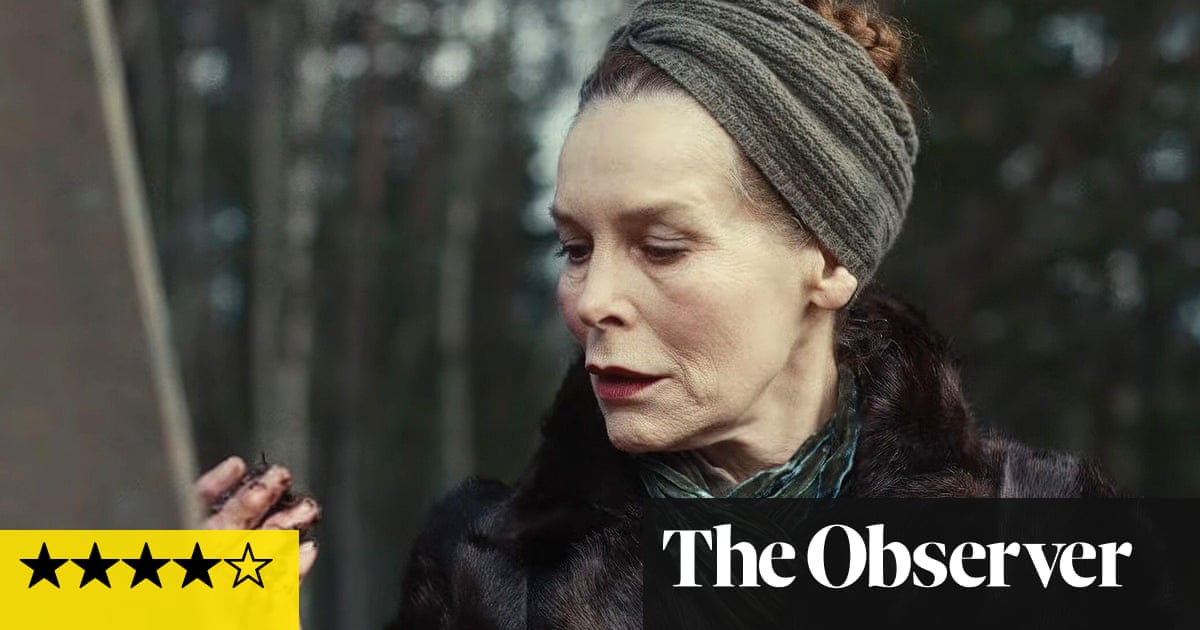
She Will review – edgy psychological horror meets feminist revenge fable
This viscerally atmospheric directorial feature debut from the Franco-British artist and film-maker Charlotte Colbert arrives with a stamp of approval from a maestro of Italian horror (“Dario Argento presents”) and a glowing endorsement from Mexican Oscar-winner Alfonso Cuarón, who says it “sits in the tradition of great psychological horror films”. A chilling tale of buried secrets and dreamy vengeance with a subversive feminist edge, this latterday fable marries the spiralling, self-reflexive narrative of Shirley Jackson’s novel The Haunting of Hill House with echoes of the off-kilter visual sensibility of the 1962 cult oddity Carnival of Souls. A thrillingly intense central performance by Alice Krige (who earned her genre spurs in the underrated 1981 screen adaptation of Peter Straub’s Ghost Story) is the lightning rod at the core of the film, grounding its hallucinogenic visuals in the terra firma of past tragedies and modern traumas, provoking “dark thoughts; really dark thoughts”.
An arresting opening that intercuts surgical flashes of a mastectomy with the ritual application of makeup (“Every mask has a function… this mask is about preservation”) introduces us to Veronica Ghent, a fading screen icon to whom Krige lends a hint of Norma Desmond’s arch regality. Veronica is on a night train to Scotland, heading to a remote retreat where she can recuperate in private. “Any pain?” asks her nurse/assistant Desi (Kota Eberhardt), to which Veronica (whose face seems to be permanently repressing a scream) mirthlessly replies: “Every pain.”
The ground oozes in sticky Cronenbergian fashion beneath Veronica’s feet
Things get worse when they arrive at their destination to find it overrun by a gaggle of other guests (“the solo retreats only run in the summer – they alternate with silent yoga”). These unwelcome fellow travellers are theatrically corralled by Rupert Everett’s flamboyant Tirador – an avowedly feminist art instructor who clearly fancies himself an Oscar Wilde of the canvas and who tells his eager students that the charcoal they are using “comes from this land”, a land enriched by the ashes of countless women burned as witches over the ages. “Oh God, this is a nightmare,” declares Veronica, who is already assailed by night terrors and haunted by visions of her childhood encounter with film-maker Eric Hathbourne (Malcolm McDowell), for whom she was “my special girl”. But as fear and loathing give way to something more assertive, Veronica finds strength in the defiant spirits of the past, with life-changing results – real or imagined.
Colbert describes She Will, which she co-wrote with Kitty Percy, as “a psychological horror about a woman’s expunging of her trauma through dreams”, a tale of “revenge, the power of nature, the unconscious, the way we carry within us the muscle memory of all those who came before and all those who will come after”. That’s a boldly expansive brief, but the film makes a great fist of combining the personal and the universal, subtly interweaving historical horrors with the #MeToo threads of its modern-day narrative, leaving Hathbourne to plead pathetically that any alleged wrongdoing occurred in “a completely different era”.
Like Robert Eggers’s The Witch and Ben Wheatley’s In the Earth, Colbert’s movie roots its interior transformations in an exterior landscape that seems to pulse with life, not least during sequences in which the ground oozes in sticky Cronenbergian fashion beneath Veronica’s feet, and trees and plants are rustled by a wind that sounds like whispers. Jamie Ramsay’s widescreen cinematography drinks in the crepuscular scenery, while visionary flashes of past, present and future colliding recall the elliptical editing of Nicolas Roeg’s Don’t Look Now.
Not all of it lands. Some of the tonal shifts (Krige’s ice-pick cool versus Everett’s campy comic relief) make for somewhat mismatched bedfellows, and the plot can become a little too enigmatically unravelled. But these are minor imperfections, smoothed over by composer Clint Mansell’s throbbing, chanting score, which perfectly matches both the tactility of the visuals and the scrunchiness of the layered sound design. Coming in the wake of Rose Glass’s Saint Maud, Prano Bailey-Bond’s Censor and Romola Garai’s Amulet, this offers yet more evidence of a homegrown wave of cutting-edge movies from female film-makers who have found their natural home within the expansive possibilities of the horror genre.














